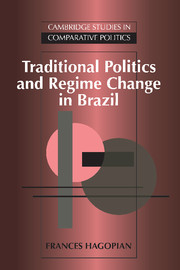Book contents
- Frontmatter
- Contents
- List of tables and figures
- Preface
- Glossary of abbreviations and Portuguese terms
- 1 Introduction: Traditional politics, new authoritarianism
- 2 Oligarchical power and traditional politics in Minas Gerais
- 3 The modern political economy of traditional politics
- 4 Bureaucratic authoritarianism and the state elite
- 5 Back to patronage: State clientelism in Minas Gerais
- 6 Authoritarian politics and traditional elites
- 7 The traditional political elite and the transition to democracy
- 8 Continuity in change: Brazilian authoritarianism and democratization in comparative perspective
- Appendix: The Minas elite
- References
- Index
2 - Oligarchical power and traditional politics in Minas Gerais
Published online by Cambridge University Press: 06 January 2010
- Frontmatter
- Contents
- List of tables and figures
- Preface
- Glossary of abbreviations and Portuguese terms
- 1 Introduction: Traditional politics, new authoritarianism
- 2 Oligarchical power and traditional politics in Minas Gerais
- 3 The modern political economy of traditional politics
- 4 Bureaucratic authoritarianism and the state elite
- 5 Back to patronage: State clientelism in Minas Gerais
- 6 Authoritarian politics and traditional elites
- 7 The traditional political elite and the transition to democracy
- 8 Continuity in change: Brazilian authoritarianism and democratization in comparative perspective
- Appendix: The Minas elite
- References
- Index
Summary
The first republic of Brazil was an archetypal oligarchical republic fashioned by regional elites to preserve their dominance within their respective states. The Old Republic (1889–1930), as it was known, restricted real political participation to a bare fraction of the population. Among participant groups, elites of smaller states were as helpless as the urban middle classes of the larger ones to challenge successfully the hegemony of the oligarchies of the strong states. These elites who were “coffee barons” or represented coffee interests used their political success to make coffee the nation's leading source of foreign exchange and wealth and thus to enrich themselves. The pattern of traditional, authoritarian politics practiced by these noncompetitive, regional oligarchies was underwritten by electoral fraud and the dependence of local governments on the state and, at the local level, by a grossly unequal distribution of land and the use of public and private force.
After four decades, the “oligarchical republic” ruptured from within amid discontent in military circles and a crisis in the coffee economy. The “Revolution” that deposed the Paulista president and delivered power to Getúlio Vargas of Rio Grande do Sul strengthened the central state and expanded the scope of its activities; set in motion the processes of economic moderation and the incorporation of new, especially urban, classes and sectors into the political system; and effectively ended the oligarchy's monopoly over the state and politics.
- Type
- Chapter
- Information
- Traditional Politics and Regime Change in Brazil , pp. 36 - 72Publisher: Cambridge University PressPrint publication year: 1996



